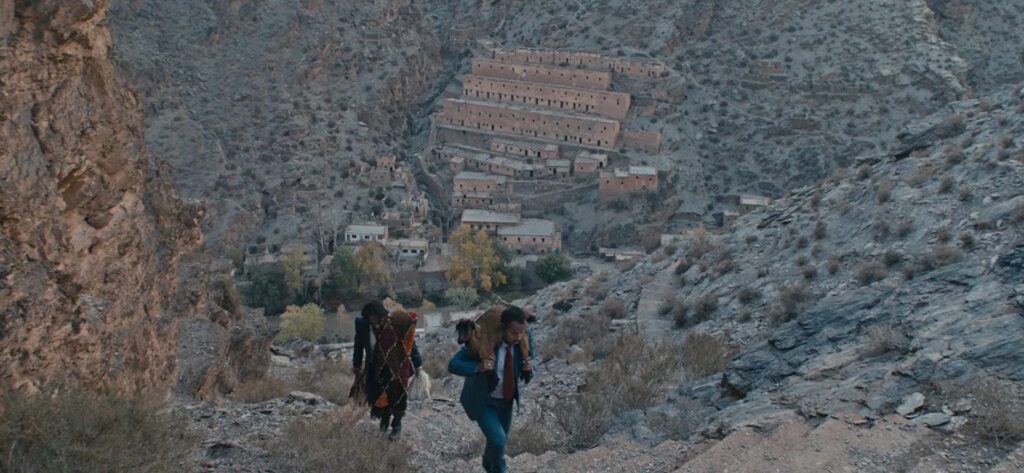“Deserts” is a film by Moroccan director Faouzi Bensaidi that tells two different stories set in the barren landscapes of southern Morocco. The film, selected for the Directors’ Fortnight at Cannes 2023, aims to contrast comedy and drama, modernity and tradition, and freedom and confinement within the harsh and unforgiving desert. It’s a film that tries to reflect the contrasts of life, much like the desert itself represents the extremes of existence.
The first story follows Mehdi (Fehd Benchemsi) and Hamid (Abdelhadi Talbi), two debt collectors who wear cheap blue suits and drive around in an old car. They try to squeeze money from poor shepherds who have nothing left. The film shows their absurd and humorous situations as they face various challenges and obstacles in their job and also reveals the economic and social inequalities of the country, as the duo exploits the desperation and ignorance of their victims while being exploited by their boss.
The second story introduces a mysterious outlaw who escapes from his captors (also Mehdi & Hamid) and goes back to his village. He wants to get his lover back and take revenge on his enemies. The tone of the film changes drastically, from comic to tragic, from absurd to poetic. And the once funny, debt-collecting duo is replaced by a silent figure crossing the desert, searching for justice and love. The desert becomes more than a backdrop; it becomes a character, a witness, a judge, and a symbolic representation of life’s harshness and desolation.

However, this is where “Deserts” loses some of its coherence and appeal. Bensaidi’s ambition to combine two contrasting genres and narratives is a bold move, but it results in a film that feels disjointed and inconsistent. The shift in tone is sudden and unexpected, which may leave viewers confused and disconnected. The transition lacks the smoothness and logic needed to blend the two halves of the film, creating a clash rather than harmony.
By comparison, Bensaidi’s previous films, “Mille Mois” (2003) and “Volubilis” (2017) also explore the socio-economic conditions of Morocco, but with more balance and cohesion. In “Deserts,” Bensaidi pushes the boundaries further, which is a plus, experimenting with genre and structure, but to a degree that feels overambitious. While this shows Bensaidi’s evolution as a filmmaker, it may not resonate with viewers who expect a more consistent and engaging story.
On a visual level, “Deserts” is stunning. The Moroccan desert, with its vast and arid landscape, is captured in breathtaking detail. The use of wide shots and close-ups emphasizes the insignificance of man against the majesty of nature, enhancing the film’s thematic exploration of duality.
“Deserts” has some elements of a Western and the lawlessness of the frontier. However, it also subverts some of the conventions of the genre, such as the use of music, the representation of violence, and the role of women who aren’t prominent in the film but represent different aspects of Moroccan society and culture, such as tradition, modernity, religion, and sexuality. They also contrast with the male characters, who are often violent, greedy, dishonest, and reckless.
Bensaidi also adds a layer of spirituality and mysticism to his film, as he explores the relationship between the protagonist and God, as well as the symbolism of the desert as a place of purification and revelation.
The film is a daring exploration of life’s dichotomies, one that tries to be both a critique of socio-economic realities and a poetic journey into the human condition. Yet, its execution falls short of its conceptual vision. But it might offer an intriguing viewing experience for those who appreciate unconventional structures and tonal shifts.
So while Bensaidi’s sixth feature film in 20 years showcases his growth and willingness to experiment as a filmmaker, it struggles to balance its ambitions. “Desert’s” attempt at merging contrasting narratives and tones results in a disjointed experience that fails to fully deliver on its promising premise.
“Deserts” is making its world premiere in the Directors’ Fortnight strand of the 2023 Cannes Film Festival.
If you appreciate our coverage here and on social media and would like to support us, please consider making a donation today. Your contribution will help us continue to do the work we do in coverage of African cinema and, more importantly, grow the platform so that it reaches its potential, and our comprehensive vision for it. Thank you for your support: https://gofund.me/013bc9f2
